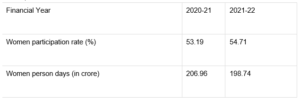Women Workforce under Mahatma Gandhi National Rural Employment Guarantee Scheme
GS Paper – 2,Government Policies & Interventions
Why in the News?
Recently, a study has been conducte to study the women participation in MGNREGS.
Mahatma Gandhi National Rural Employment Guarantee Scheme:
● Mahatma Gandhi National Rural Employment Guarantee Scheme (Mahatma Gandhi NREGS) is a demand driven wage employment scheme which provides for the enhancement of livelihood security of the households in rural areas of the country by providing at least one hundred days of guaranteed wage employment in every financial year to every household whose adult members volunteer to do unskilled manual work.
● The data includes women member of the selected households.
● The rate of participation of women (percentage of women person-days out of total) and the computed women person-days in Mahatma Gandhi NREGS during the last two financial years 2020-21 and 2021-22 is given below:
Project Unnati
● About:
○ Unnati project is a skilling project launched in 2019 intended to upgrade the skill base of the Mahatma Gandhi NREGA beneficiaries, and thereby improving their livelihoods.
○ Under the project, the selected candidates are skilled using three established training programmes — the Deen Dayal Upadhyay Grameen Kaushal Yojana (DDU-GKY), the Rural Self Training Institute (RSETI) and the Krishi Vigyan Kendra.
○ This project is meant for providing training for one adult member (of age 18-45 years old) of a household who has completed 100 days of work under Mahatma Gandhi NREGA in the previous financial year from the year of commencement of the project.
● Features:
○ The household from which candidates are selected for the training, continue to enjoy 100 days of work under Mahatma Gandhi NREGA.
○ The candidates undergoing training are paid a stipend for a maximum period of 100 days and for one program per household as per the wage rate prevailing in the concerned State/UT as per the provisions of the project.
○ Full expenditures towards a stipend, against wage loss compensation, are entirely borne by the Central Government.
○ Total of 2,00,000 beneficiaries shall be imparted training under this project in a span of three years in 26 States and 2 UTs.
Significance
● The whole purpose of the project is to connect the rural people to various available livelihood opportunities and lead them to self-reliance and sustainable development.
● It is improving the livelihoods of the neediest Mahatma Gandhi NREGA beneficiaries by providing a skill, either for self-employment or wage employment.
Scheme’s performance
● The performance so far has been far below this 20% target.
● In the 2020-21 financial year for example, 71 lakh households worked for 100 days in the country under the MGNREGS but only 8,658 persons received training under the Unnati project.
● Similarly, in 2021-2022, the number of eligible households stood at 59 lakh, but only 12,577 persons were trained.
● The onset of the COVID-19 pandemic that coincided with the launch of the project is also blamed for its tardy implementation.




